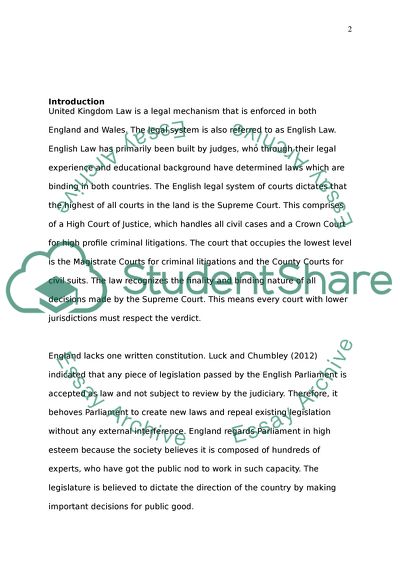Cite this document
(Sources of English Law Coursework Example | Topics and Well Written Essays - 2000 words, n.d.)
Sources of English Law Coursework Example | Topics and Well Written Essays - 2000 words. https://studentshare.org/law/1799832-explain-with-references-to-english-legal-system-sources-of-english-law-and-hierarchical-nature-of-the-courts-in-england-and-wales-the-extent-to-which-the-laws-in-england-are-created-and-interpreted-by-the-judges
Sources of English Law Coursework Example | Topics and Well Written Essays - 2000 words. https://studentshare.org/law/1799832-explain-with-references-to-english-legal-system-sources-of-english-law-and-hierarchical-nature-of-the-courts-in-england-and-wales-the-extent-to-which-the-laws-in-england-are-created-and-interpreted-by-the-judges
(Sources of English Law Coursework Example | Topics and Well Written Essays - 2000 Words)
Sources of English Law Coursework Example | Topics and Well Written Essays - 2000 Words. https://studentshare.org/law/1799832-explain-with-references-to-english-legal-system-sources-of-english-law-and-hierarchical-nature-of-the-courts-in-england-and-wales-the-extent-to-which-the-laws-in-england-are-created-and-interpreted-by-the-judges.
Sources of English Law Coursework Example | Topics and Well Written Essays - 2000 Words. https://studentshare.org/law/1799832-explain-with-references-to-english-legal-system-sources-of-english-law-and-hierarchical-nature-of-the-courts-in-england-and-wales-the-extent-to-which-the-laws-in-england-are-created-and-interpreted-by-the-judges.
“Sources of English Law Coursework Example | Topics and Well Written Essays - 2000 Words”. https://studentshare.org/law/1799832-explain-with-references-to-english-legal-system-sources-of-english-law-and-hierarchical-nature-of-the-courts-in-england-and-wales-the-extent-to-which-the-laws-in-england-are-created-and-interpreted-by-the-judges.


